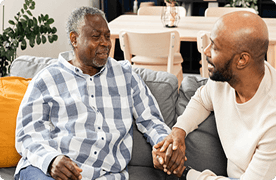Talking about suicide can help prevent it
People who are thinking about suicide often feel alone. Starting a conversation lets them know it’s okay to get help and that someone is there to listen.
If you’re thinking about suicide, Call or Text 9-8-8 to get help now.
Call 911 for a medical emergency.
Ask, Listen, and Learn
Knowing how to Ask, Listen, and Learn (ALL) is something we can ALL do to help prevent suicide.
When you Ask about suicide directly, it won’t make things worse. Instead, it lets the person know that they can talk about it. Then, Listen with purpose and Learn how to connect them to help.
 Learn how we can ALL help
Learn how we can ALL help

How to ask about suicide directly
Find out how to start the conversation and connect to help when you think someone is thinking about suicide.

What to do if someone’s thinking of suicide
Learn how to listen, respond, and connect someone to help if they say they are thinking about suicide.

Learn what helps during the conversation
Understand how to talk to someone who's thinking about suicide with 5 action steps from experts.
 Places that can help
Places that can help
County of San Diego Behavioral Health Services
Learn about specialty mental health and substance use services for adults and kids offered by County of San Diego Behavioral Health Services.
9-8-8 Lifeline
Calling or texting 9-8-8 can connect you with trained counselors who can help, including local professionals at San Diego County’s Access & Crisis Line. Support is available 24/7 if you or someone you know is struggling emotionally.
Talk It Out SD
Youth can see how to support a friend or how to find support for themselves.
Mobile Crisis Response Teams (MCRT)
MCRT can help people who need help with substances or alcohol, are feeling hopeless or anxious, or are thinking about suicide.
 More info about suicide prevention
More info about suicide prevention

Signs that someone may need help
Pain isn’t always obvious, but most people considering suicide show early signs that they are thinking about it.

Remove firearms to keep them safe
Removing access to guns from someone in a suicidal crisis saves lives and gives them what they crucially need: time.

Talk with your teens early and often
Learn why talking to your teen about suicide early, often, and directly makes things better, not worse.
 Places that can help
Places that can help
 More info about suicide prevention
More info about suicide prevention
County of San Diego Behavioral Health Services
Learn about specialty mental health and substance use services for adults and kids offered by County of San Diego Behavioral Health Services.

Signs that someone may need help
Pain isn’t always obvious, but most people considering suicide show early signs that they are thinking about it.
9-8-8 Lifeline
Calling or texting 9-8-8 can connect you with trained counselors who can help, including local professionals at San Diego County’s Access & Crisis Line. Support is available 24/7 if you or someone you know is struggling emotionally.

Remove firearms to keep them safe
Removing access to guns from someone in a suicidal crisis saves lives and gives them what they crucially need: time.
Talk It Out SD
Youth can see how to support a friend or how to find support for themselves.

Talk with your teens early and often
Learn why talking to your teen about suicide early, often, and directly makes things better, not worse.
Mobile Crisis Response Teams (MCRT)
MCRT can help people who need help with substances or alcohol, are feeling hopeless or anxious, or are thinking about suicide.
